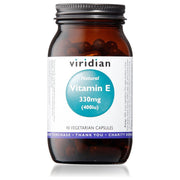100,000+ Orders Shipped
Call us free: 0800 098 8888
Family Run 40 Years +
Money Back Guarantee
Vitamin E
Can’t find what you are looking for? Contact Us and we will look to get it for you (at a great price and no delivery charge). If you are the first person to suggest a new product to us that we start to keep in stock, we’ll even send you one for free!
Vitamin E - The Nutrition Source
There are several different types of vitamins E, but only one form (α-tocopherol) is used by the human body; however, α-tocopherol is not the only type of tocopherol found in foods. It has two main roles: acting as an antioxidant, which helps remove free radicals from the body; and helping maintain healthy blood flow by relaxing blood vessels. It helps prevent blood clogs by enhancing immune function and preventing clogs from developing in heart arteries. Free radicals were first discovered in the 1980s when researchers realized they could be linked to heart disease, cancer, vision loss, etc. Vitamin E protects cells from free radical damage and reduces the formation of free radicals in some situations.
Food Sources
Vitamin E is found naturally in plants, including vegetable oil, peanuts, almonds, sunflower seeds, and spinach.
Below area few examples:
- Wheat germ oil
- Sunflower, safflower, and soybean oil
- Sunflower seeds
- Almonds
- Peanuts, peanut butter
- Beet greens, collard greens, spinach
- Pumpkin
- Red bell pepper
- Asparagus
- Mango
- Avocado
Signs of Deficiency
Since there are so many different sources for vitamins E, a deficiency is uncommon. Those who suffer from digestive disorders or don't absorb fats well (e.g., pancreas inflammation, cystic fibrosis, celiac diseases) may develop a vitamin E deficiency
The following are common symptoms of a vitamin E deficit:
- Retinopathy (damage to the retina of the eyes that can impair vision)
- Peripheral neuropathy (damage to the peripheral nerves, usually in the hands or feet, causing weakness or pain)
- Ataxia (loss of control of body movements)
- Decreased immune function
Recommended Amounts
For men and women aged 14 years and older, the recommended dietary allowance (RDA) for vitamins A and C is 400 micrograms per day (mcg/d). Including women who are pregnant. Women who are lactating need slightly less than 28 international units (IU) per day.
Vitamin E - Frequently Asked Questions
What can vitamin E do for hair?
Many people claim that vitamin E has various beneficial effects on hair health, but there isn't enough solid research to support any of these claims.
Most of the claims regarding the benefits of using vitamins for hair care relate to their antioxidant properties. They're focused on the idea that they can reduce cell damage and help grow hair.
What is vitamin E?
Vitamin E is an essential nutrient found in foods such as nuts and seeds, and leafy greens. Vitamin E is an essential nutrient needed by the human organism for many functions.
Vitamin E is used for treating or preventing vitamin E deficiencies. Some people with certain illnesses may need extra vitamin E supplementation.
What other drugs will affect vitamin E?
Tell your doctor about all medicines you use, and those you start or stop using during your treatment, especially:
- Cholestyramine
- Mineral oil
- Orlistat (alli, Xenical)
- Warfarin (Coumadin, Jantoven)
This list is not exhaustive. You should be aware that some medications may interact with dietary supplements containing high levels of alpha-tocopherol (vitamins E). Some medications may interact with each other. You should talk to your doctor if you're taking any medications.
If you are interested to learn more about Vitamin C or Vitamin B?









